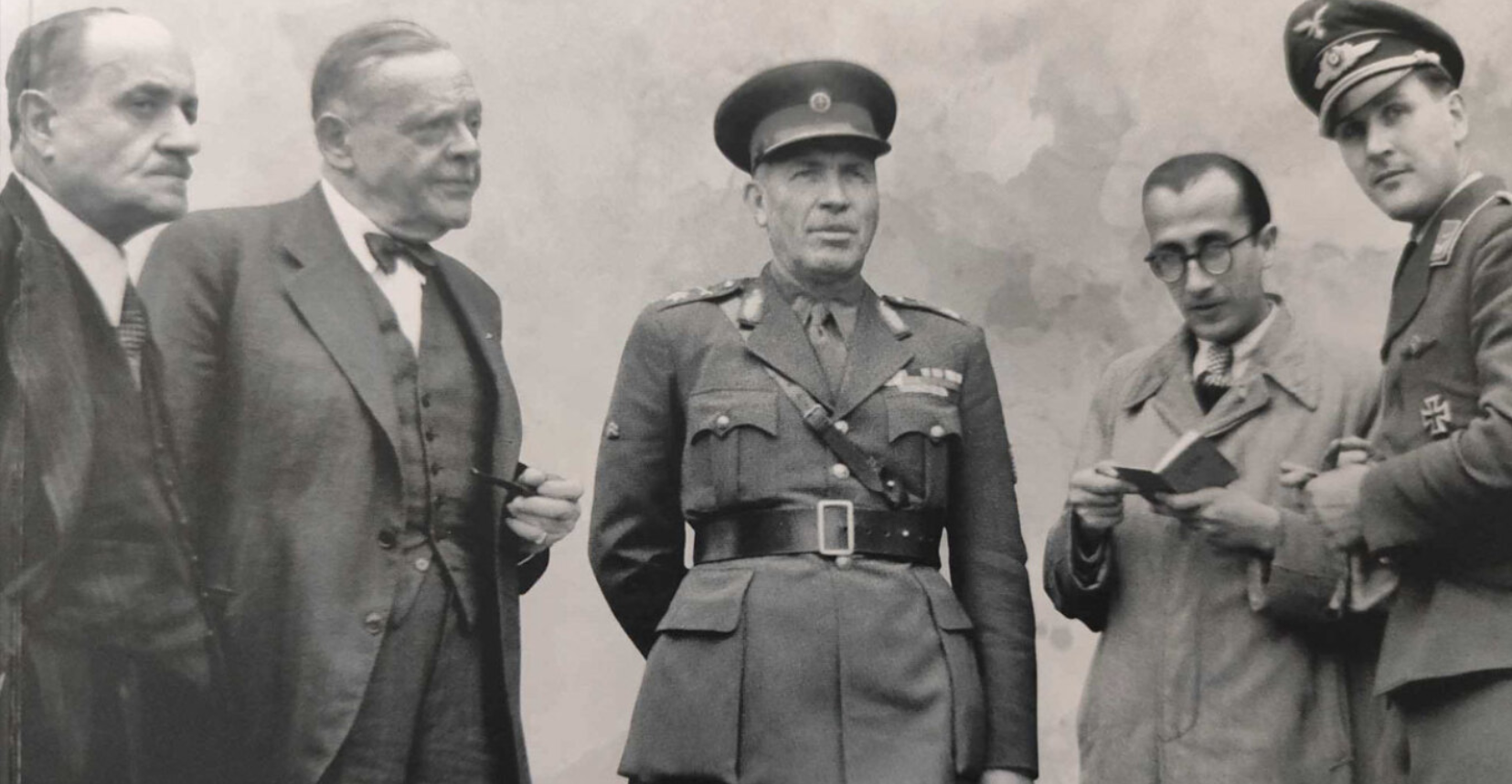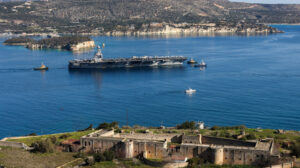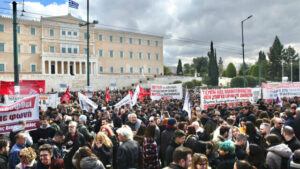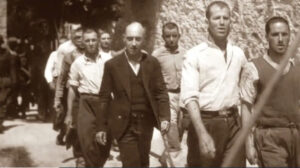More than 80 years have passed since our country was occupied by the Germans and Italians, yet the issue of those who collaborated with the occupiers during those harsh years and got rich—while other compatriots starved to death or risked their lives in resistance—still concerns many. Menelaos Charalampidis, in his excellent book The Quislings (Alexandria Publications), which since its first release in December 2023 had already reached five editions by April 2024—a rare but encouraging sign for those who still read books—presents dozens of such cases. He dedicates almost 50 pages (103-152) to the economic collaboration between Greeks and the occupiers.
Economic Relations Between Greece and Germany Before World War II
Economic, like all other forms of collaboration with the occupiers, occurred in all occupied European countries. In Eastern Europe and the Balkans, the occupation was harsher compared to other occupied European nations, mainly due to the geostrategic priorities of the Nazi regime.

Prodromos Athanasiadis Bodossakis
With the exception of Crete due to its geographical position, Greece was considered a secondary conquest. However, Greek-German economic relations had been well developed since the early 1930s. Germany, leveraging the trade clearing agreement signed in 1932—before Hitler’s rise to power—strengthened its economic presence in Greece by importing agricultural products (mainly tobacco) and exporting industrial goods, particularly weapons systems, especially after Ioannis Metaxas struck a deal with the Nazis in the summer of 1936.
A central figure in this arrangement was Prodromos Bodossakis Athanasiadis, who had taken control of almost the entirety of Greece’s defense industry and had established business ties with major German armament manufacturers. It is worth noting that the leading military equipment manufacturer for the German armed forces—since World War I—was Krupp.

A German and an Italian Soldier in Athens
In his 2014 doctoral dissertation, Economy and Politics in Greece During World War II, Vasileios Manousakis states that in 1938, 38.5% of Greek exports were destined for Germany, while 29% of the country’s imports came from there. Thus, close economic ties had already been established before World War II.
After 1941, many Greeks who had pre-war business dealings with Germany continued their financial transactions with the Nazis. In particular, trade representatives of German companies in Greece maintained their smooth economic cooperation with the Third Reich throughout the Occupation years. But how exactly can “economic collaboration” be defined? This is a question Menelaos Charalampidis rightfully raises.

Metaxas and Bodossakis
According to Legislative Act No. 6, Article 1, Section IA, published in Government Gazette 12/20 January 1945 (Issue A), titled On Sanctions Against Those Who Collaborated with the Enemy, economic collaborators were prosecuted if they had:
- Exploited their financial dealings with the enemy to cause harm to the Greek people or Greek citizens,
- Assisted the enemy’s war efforts in any way, or
- Gained excessive financial benefits.
According to Menelaos Charalampidis, “economic collaborators” can be defined as those who improved their financial standing during the Occupation by working for the occupiers. Two-thirds of the cases tried in the post-war Special Courts in Athens and Piraeus were classified as economic collaboration. However, many cases never made it to court and were dismissed with acquittals.
The main reasons that led some to collaborate with the occupiers were their pre-war financial ties with Germany, their pro-German stance, and their belief in an ultimate German victory.

German Soldiers in Greece
As for the criteria by which individuals were convicted by the Special Courts, they primarily included the enrichment of German collaborators through the purchase of real estate and a luxurious lifestyle, as well as the use of violence and pressure on their workers to accelerate and increase production. Obviously, this category did not include the owner of a restaurant where the Nazis dined or a cinema or other venue where they were entertained.
Thus, the main defendants as Nazi collaborators were civil engineers and contractors who undertook construction projects for the occupiers, merchants and suppliers who provided the occupiers with various goods, and finally, industrialists and craftsmen whose production units were requisitioned by the occupiers or who executed contracts on their behalf.
Civil Engineers and Contractors – Collaborations with the Occupiers
Greece was a key supply route for German troops in North Africa. Therefore, the war-damaged infrastructure from the Greco-Italian War needed to be reconstructed, existing ones improved, new ones built, and fortifications constructed, among other projects. In June 1941, the Tsolakoglou government issued a legislative decree approving an advance payment of 18,470,840 drachmas for roadworks carried out on behalf of the Nazis, awarded to companies such as “ERTHA Müller & Co.,” “Cyclops,” and others.

Protesters Demand Punishment for the Traitors of the Nation After Liberation
Article 3 of the relevant decree stipulated that such payments were “exempt from any withholding or taxation.” By April 1, 1943, the records of the Supply Control Committee for the Occupation Authorities listed 750 contractors in Athens and 170 contractors and suppliers in Piraeus. By the end of June 1944, 2,000 suppliers and contractors had been paid for projects executed directly by the Occupation Authorities, without any bidding process.
There were also key individuals in critical positions who arranged these contracts. One such person was civil engineer Panagiotis Xanthopoulos, who had studied in Germany in the early 1930s, married a German woman, spoke fluent German, and, according to rumors, was a member of the Todt Organization. This was essentially a company headed by Nazi Minister of Armaments and War Production Fritz Todt, responsible for fortifications and road construction in occupied Europe. Xanthopoulos was allegedly involved in German espionage networks before World War II. Witnesses in post-war trials claimed he participated in an attempt to blow up the British ship “SAMIR” in the port of Piraeus in August 1940. As a result, the Metaxas regime exiled him to Ikaria.
However, during the Occupation, Xanthopoulos became the head of the technical services of the Municipality of Piraeus and naturally acted as a liaison between the German Garrison Command of Piraeus and the municipality.

Alexandros Zachariou, Founder of the TEKTON Company
Gradually, he established contact with the German service stationed at the Ministry of Public Works under Major Zell. According to the Ministry’s General Director, Xanthopoulos recommended to Zell the Anonymous Contracting Company for Maritime and Hydraulic Works “ERTHA,” the General Technical Execution Company “GETE,” the Anonymous Construction Company “TEKTON,” the company “Michael Averoff & Co.,” and the company “ERGON” as suitable companies to undertake technical projects for the Germans. Over time, Xanthopoulos expanded his influence across Greece, playing a significant role in all kinds of Nazi projects: roadworks along the Athens-Thessaloniki-Bulgarian border axis, demolition of houses in Hellinikon (then known as Chasani) for the expansion of the airstrip, participation in the construction of cement barges in Perama, projects in Lamia and the Tanagra airport. Xanthopoulos even went so far as to establish a company engaged in illegal logging in Macedonian forests!
After World War II, he was sentenced in absentia to life imprisonment in two separate trials. Eventually, in May 1947, he appeared at his third trial and got off lightly, receiving only a three-year prison sentence! Additionally, the conservatory seizure of his assets was lifted, and the confiscated properties were returned to him! He was also sentenced to life deprivation of his political rights, which, however, he “regained” in March 1951. From that point on, Xanthopoulos no longer faced any consequences whatsoever…
A related trial to the Xanthopoulos case, concerning construction projects, involved eight defendants from Athens’ upper class and became known as the “Kolonaki Trial” because seven of the eight defendants resided in Kolonaki. On September 1, 1945, the trial of seven civil engineers and one industrialist began at the Special Court of Athens. The most prominent name among them was Michael Averoff, brother of Evangelos Averoff.
According to “Rizospastis” on July 5, 1945, in this case, interventions by General Commissioner H. Tsiampasis led to the resignation of one investigator and the removal of another during the preliminary investigation. M. Charalambidis recorded the surnames of the prosecution witnesses using only their initials (Konstantinos L., Achilleas K., etc.).

Despite the heavy charges, Michael Averoff was acquitted after presenting three documents from British military and diplomatic authorities certifying that he was acting on behalf of the “Allied Struggle” and had undertaken the projects with the approval of the “Allied Authorities” for the purpose of “organizing espionage and sabotage against the enemy.” Ultimately, the Special Court acknowledged that Averoff executed the projects in question, which undoubtedly benefited the Occupation Authorities, but acquitted him on the grounds that he carried them out in support of the “Allied Struggle.”
Six of his co-defendants were also acquitted, while only one was sentenced to four years in prison—but was released after just one year… A notable detail is that one of the defendants, Zacharias Argyropoulos, had purchased two two-story houses in Pangrati, 50% of a one-acre plot on Stisichorou Street (behind today’s Presidential Mansion), 24% of a house in Kolonaki on Ploutarchou Street, and an 812-square-meter “field” on Nafpliou Street in the Plato Academy area. Other defendants had done the same, but the Special Court did not seem particularly interested in this matter…

Ask me anything
Explore related questions





